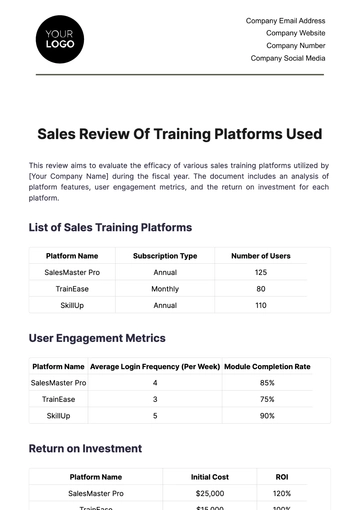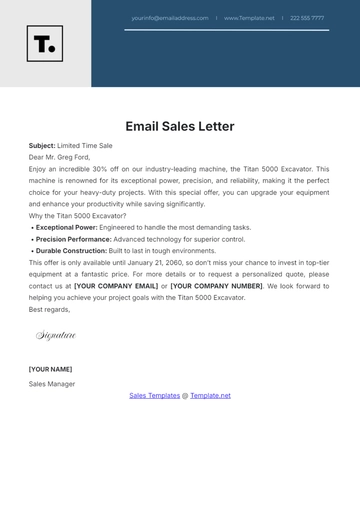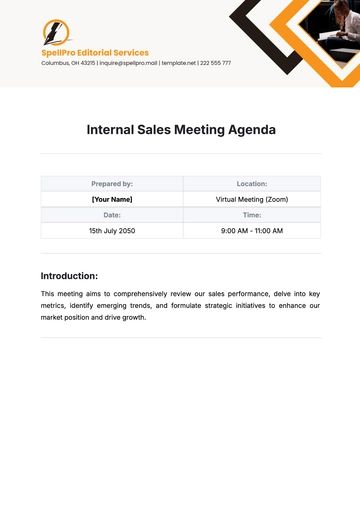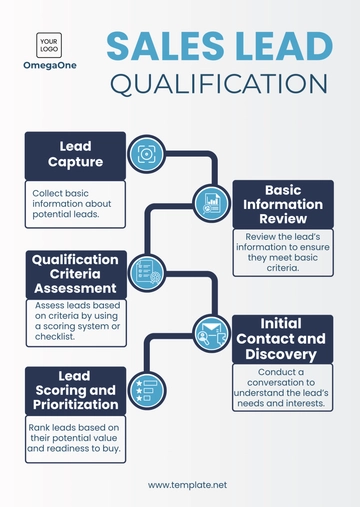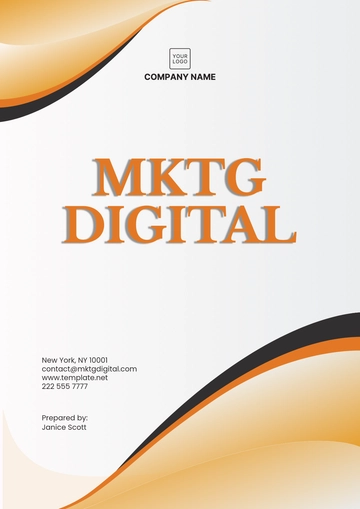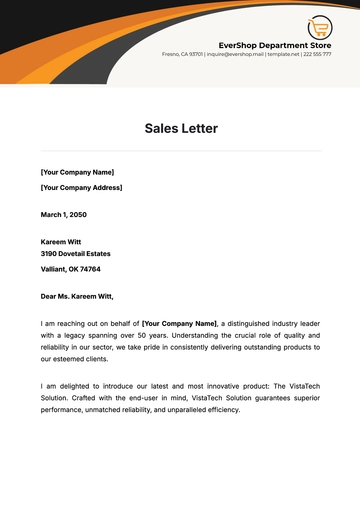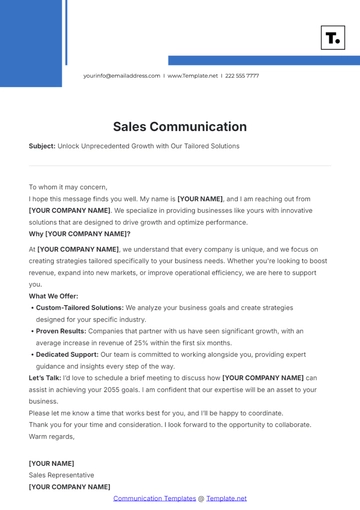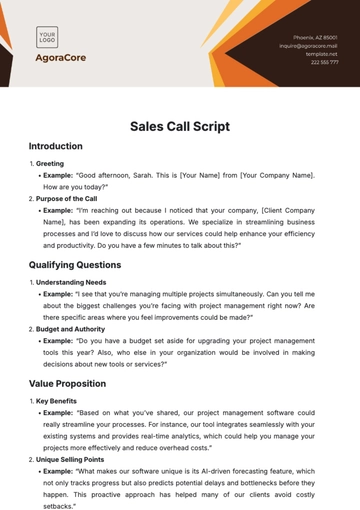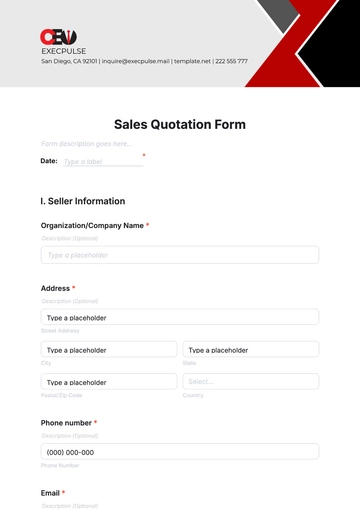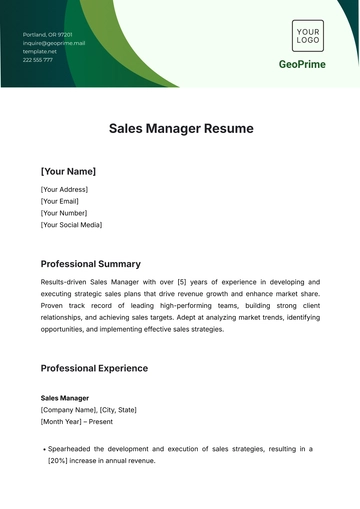Free Sales Training Trends Journal

Throughout the course of this journal, we will delve into the evolution of sales training landscapes, the prevailing patterns as well as the future forecasts based on recent data and expert opinions. Sales training is an essential mechanism for [Your Company Name] and companies of all sizes to ensure their sales teams are equipped to achieve their goals.
Introduction
In the dynamic sphere of sales, training methodologies have undergone a profound transformation, transitioning from the conventional classroom setups to innovative, digitally-driven platforms. This evolution signifies a broader shift towards highly specialized and interactive learning experiences, tailored to enhance specific competencies such as negotiation, closing techniques, and sector-specific sales strategies. As we navigate through the intricate tapestry of sales training's past, present, and anticipated future, we aim to provide a comprehensive overview of its evolving landscape, underscored by the latest trends, expert insights, and predictive analyses.
1. Emerging Trends
The landscape of sales training is undergoing a rapid transformation, driven by technological advancements, shifts in consumer behavior, and the increasing complexity of the sales environment. To remain competitive and effective, it's crucial for organizations to adapt to these changes and incorporate the latest trends into their sales training programs. Here, we delve into some of the most significant emerging trends in sales training and discuss how they are reshaping the way sales teams are prepared for success.
Personalization and Customization
One of the most notable trends is the move towards personalized and customized training programs. Sales teams are diverse, with members possessing varying levels of experience, knowledge, and skill sets. Recognizing this, companies are now adopting training solutions that cater to the individual learning needs and preferences of each salesperson. This approach not only enhances the learning experience but also ensures that the training is relevant and impactful, leading to improved sales performance and efficiency.
Microlearning
Another significant trend is the adoption of microlearning strategies. This involves breaking down training content into small, easily digestible modules that can be consumed in a short amount of time. Microlearning caters to the modern learner's short attention span and busy schedule, allowing sales personnel to learn on-the-go and apply new knowledge and skills quickly to their work. This method has proven to be highly effective in improving knowledge retention and facilitating continuous learning and development.
Gamification
Gamification of sales training is becoming increasingly popular as a means to engage and motivate sales teams. By incorporating game-like elements such as points, badges, and leaderboards into training programs, companies can create a more engaging and competitive learning environment. Gamification not only makes learning more fun but also encourages participation, boosts motivation, and fosters a sense of achievement among sales personnel.
Social Learning
The rise of social learning platforms has enabled sales teams to learn from each other in a collaborative environment. These platforms allow for the sharing of knowledge, experiences, and best practices among peers, creating a rich learning ecosystem that benefits the entire team. Social learning encourages communication and collaboration, helping to build a stronger, more cohesive sales team that is better equipped to tackle challenges and achieve goals.
2. Impact of Technology
The advent of digital technology has revolutionized sales training, offering new ways to deliver, enhance, and measure the effectiveness of training programs. The impact of technology on sales training is profound, with several key developments shaping the future of how sales professionals are trained.
E-Learning Platforms
E-learning platforms have become a cornerstone of modern sales training programs. These platforms offer a wide range of training materials that can be accessed anytime, anywhere, providing flexibility and convenience for sales teams. E-learning platforms support a variety of content formats, including videos, podcasts, articles, and interactive modules, catering to different learning styles and preferences. This has dramatically expanded the reach and accessibility of sales training, enabling continuous learning and development.
Virtual Classrooms
Virtual classrooms have emerged as a powerful tool for delivering live, interactive training sessions to geographically dispersed sales teams. These virtual environments replicate the experience of a traditional classroom, allowing for real-time interaction between instructors and learners. Virtual classrooms facilitate live demonstrations, role-playing exercises, and group discussions, making the learning experience more engaging and effective. They also offer the added benefits of recording and replaying sessions, enabling learners to review material at their own pace.
Training Apps
Mobile training apps have become increasingly popular, providing sales teams with access to training materials directly from their smartphones or tablets. These apps offer convenience and flexibility, allowing sales personnel to engage in training activities during downtime or while on the move. Training apps often include features such as quizzes, flashcards, and progress tracking, enhancing the learning experience and making it easier for sales teams to acquire and retain new knowledge and skills.
The emergence of new trends and the impact of technology have fundamentally transformed the landscape of sales training. By embracing these developments, organizations can ensure their sales teams are equipped with the latest knowledge, skills, and tools needed to thrive in today's competitive market. The future of sales training is dynamic and promising, with continued innovation and adaptation being key to achieving sustained success.
3. Paradigm Shift in Sales Training
The landscape of sales training is experiencing a significant paradigm shift, moving away from the traditional model of periodic, event-based training sessions to a more dynamic, continuous learning framework. This transformation reflects a deeper understanding of the nature of sales in the modern marketplace, where change is the only constant, and adaptability is key to success. Below, we explore the drivers of this shift and its profound implications for the sales profession.
Continuous Learning and Development
At the heart of this paradigm shift is the recognition that effective sales training cannot be achieved through one-off events. Instead, it requires a commitment to ongoing learning and development, where salespeople are continuously updated on the latest methods, processes, and technologies. This approach ensures that sales teams remain agile, capable of adapting to new market demands, customer behaviors, and competitive pressures. Continuous learning environments foster a culture of curiosity and improvement, encouraging sales personnel to constantly seek out new knowledge and refine their skills.
Upskilling and Reskilling
The rapid pace of technological innovation and shifting market dynamics necessitate regular upskilling and reskilling of sales teams. Sales professionals must not only refine their existing skills but also acquire new competencies in areas such as digital selling, data analysis, and customer experience management. This ongoing process of skill development enables salespeople to leverage the latest tools and techniques, enhancing their effectiveness and efficiency. By investing in the continuous upskilling and reskilling of their sales teams, organizations can maintain a competitive edge in an increasingly complex sales environment.
Integration of New Technologies
The paradigm shift in sales training is also characterized by the integration of new technologies into the learning process. Advanced tools such as artificial intelligence (AI), virtual and augmented reality (VR/AR), and sophisticated sales enablement platforms are transforming the way sales training is delivered and consumed. These technologies offer personalized, immersive, and interactive learning experiences, making training more engaging and effective. Additionally, they enable real-time performance tracking and analytics, allowing sales leaders to monitor progress and tailor training programs to meet the specific needs of their teams.
4. Future Forecasts for Sales Training
Looking ahead, the future of sales training is poised for further evolution, with several key trends expected to shape the industry. Drawing on expert forecasts, this section explores the emerging themes that are likely to influence the direction of sales training in the coming years.
Increased Emphasis on Emotional Intelligence and Soft Skills
As sales processes become more complex and customer expectations continue to rise, there is a growing recognition of the importance of emotional intelligence and soft skills in sales success. Future sales training programs are expected to place greater emphasis on developing skills such as empathy, active listening, and relationship building. These competencies are crucial for creating meaningful connections with customers, understanding their needs, and providing personalized solutions. As a result, sales training will likely evolve to include more comprehensive modules on emotional intelligence and soft skills, alongside traditional focus areas such as product knowledge and negotiation tactics.
Leveraging Data and Analytics in Sales Training
The future of sales training will increasingly involve the use of data and analytics to personalize learning paths, assess performance, and identify areas for improvement. Advanced analytics tools will enable sales organizations to gather insights from a variety of sources, including CRM systems, sales interactions, and training platforms. This data-driven approach will allow for more targeted and effective training programs, ensuring that salespeople receive the support they need to address their specific challenges and opportunities.
Adoption of Microlearning and Mobile Learning
Microlearning and mobile learning are expected to gain further traction in the future of sales training. These approaches align with the preferences of modern learners, who favor short, focused learning sessions that can be easily accessed on-demand. Microlearning modules, delivered through mobile apps or online platforms, offer a flexible and convenient way for sales teams to engage in continuous learning without disrupting their work schedules. This trend towards bite-sized, mobile-friendly content will continue to grow, reflecting the changing dynamics of work and learning in the digital age.
Focus on Experiential Learning and Real-World Application
Finally, future sales training programs are likely to place a greater focus on experiential learning and the real-world application of skills. Simulation-based training, role-playing exercises, and on-the-job coaching will become increasingly common, providing salespeople with opportunities to practice and apply new skills in realistic scenarios. This hands-on approach ensures that learning is directly relevant to the salesperson's role and responsibilities, enhancing the transfer of knowledge to the sales floor and ultimately leading to improved performance and results.
The paradigm shift towards continuous learning and the future forecasts for sales training point towards an exciting era of innovation and development in the field. By embracing these changes, organizations can prepare their sales teams for the challenges of the modern sales landscape, ensuring they are equipped with the knowledge, skills, and tools needed to achieve sustained success.
Conclusion
In the face of an ever-evolving sales landscape, the imperative for businesses to adapt and refine their training strategies has never been more pronounced. The journey through the dynamic realm of sales training, as chronicled in this journal, illuminates the multifaceted shifts and advancements characterizing its progression. It is clear that the future of sales training is not a distant horizon to be observed but an immediate reality to be engaged with and shaped.
Our exploration has not only mapped the contours of the current state of sales training but also charted the exciting potentials that lie ahead. By delving into emerging trends, the transformative impact of technology, the paradigm shift towards continuous learning, and expert forecasts, we have endeavored to provide a comprehensive lens through which the complex tapestry of sales training can be understood and navigated.
This journal serves as a beacon for those seeking to stay abreast of the rapid changes in sales training methodologies and technologies. The insights and expert opinions presented herein are intended to arm our readers with the knowledge and foresight needed to navigate the complexities of this ever-changing domain. By embracing the principles of continuous learning, personalization, and technological integration, organizations can not only stay competitive but also thrive in the sales arena.
As we look to the future, it is evident that the evolution of sales training will continue at an accelerated pace, driven by innovation and the relentless pursuit of excellence. The organizations that succeed will be those that view sales training not as a static requirement but as a dynamic, ongoing process that is integral to their strategy for growth and success. They will be the ones that invest in their sales teams with a long-term vision, fostering a culture of continuous improvement and adaptation.
In conclusion, the landscape of sales training is rich with opportunity and challenge alike. This journal has provided a roadmap for navigating this landscape, highlighting the critical importance of staying informed, adaptable, and forward-thinking. As we move forward, let us embrace the changes and challenges as opportunities to redefine excellence in sales training, driving performance, and achieving unprecedented success in the sales domain.
- 100% Customizable, free editor
- Access 1 Million+ Templates, photo’s & graphics
- Download or share as a template
- Click and replace photos, graphics, text, backgrounds
- Resize, crop, AI write & more
- Access advanced editor
Unveil the Sales Training Trends Journal Template at Template.net. This highly customizable and editable resource through our user-friendly AI editor tool is your gateway to the latest sales insights. Dive into emerging trends, technology impacts, and personalized training strategies. Stay ahead in this year and beyond with our comprehensive journal, empowering your salesforce for success.







